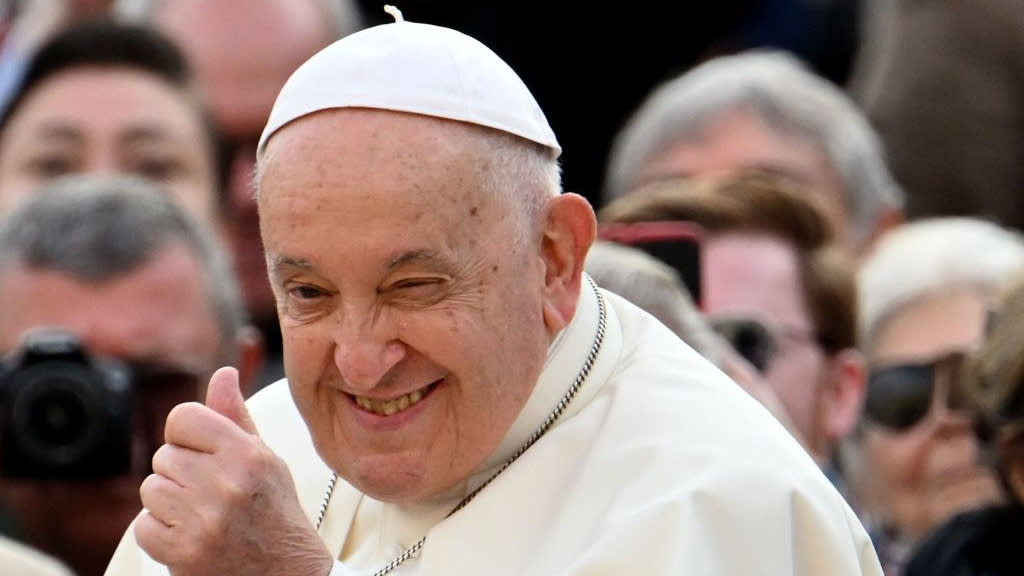The Vatican half-embraces transgender Catholic godparents, wedding witnesses

- Oops!Something went wrong.Please try again later.
The Vatican said Nov. 8 that transgender Catholics can be baptized and serve as godparents at a baptism, and that nothing in church law prevents gay or transgender people from serving as witnesses in Catholic weddings. The new document, signed Oct. 31 by Pope Francis and Cardinal Víctor Manuel Fernández, the new head of the Vatican's doctrinal watchdog, also clarified that the children of same-sex couples can be baptized. There are, of course, caveats and theological fine print.
The document released by the Dicastery of the Doctrine of the Faith, written in Italian and Portuguese, was Fernández's response to six questions from Brazilian Bishop José Negri. The answers reflect Francis' pastoral approach to the papacy and outreach to LGBTQ Catholics, without changing the church's moral teachings on homosexuality and gender.
Updates on baptism
In the Catholic Church, baptism is administered — mostly to young children — to cleanse residual sin and initiate people into the Christian church. Children and adolescents "with issues of a transsexual nature" can be baptized "if well prepared and willing," the document said. And "a transsexual — undergoing hormonal treatment and sex-reassignment surgery — can be baptized, under the same conditions as other faithful, if there are no situations in which there is a risk of generating public scandal or disorientation in the faithful."
"The term 'scandal' in Roman Catholic theology has a specific meaning" that's different than just "moral outrage," NPR reported. According to the Catechism of the Catholic Church, scandal is "an attitude or behavior which leads another to do evil," tempts a person to commit sin or "damages virtue and integrity."
The question of transgender godparents, as it relates to baptism, "is more complicated," Vatican News reported, because "being a godparent is not a right." Transgender Catholics can "be admitted to the role of godfather or godmother," under "certain conditions," the dicastery document said.
In borderline cases, transgender godparent candidates could be offered another role in the baptism, such as a witness, the document suggested, or "another person from the family circle might act as guarantor of the correct transmission of the Catholic faith to the baptized person."
Updates on marriage
Same-sex couples cannot be married in the Catholic Church, though Francis left a door open in October to priests blessing same-sex couples — so long as it was clear the blessing was distinct from the sacrament of marriage. But gay and transgender people can act as witnesses at Catholic weddings because nothing "in current universal canonical legislation" prohibits it, the new document said.
What does all this mean, practically?
The Catholic Church still holds that "homosexual acts" are "intrinsically immoral" and "contrary to the natural law." And "while any statement about transgender Catholics is liable to stir conversation among Vatican observers and, especially, Catholics on the internet," Religion News Service noted, this new guidance doesn't change any Catholic teaching or even necessarily break any new ground.
"There are no doctrinal changes here," prominent canon lawyer Nicholas P. Cafardi told The New York Times. On the other hand, this is "an actual document, not just a passing comment" from the pope, Madeline Marlett, a 26-year-old transgender Catholic in Massachusetts, told the Times. "That gave me a little bit of joy and a little bit of hope."
“In many dioceses and parishes, including in the U.S., transgender Catholics have been severely restricted from participating in the life of the church, not because of any canon law, but stemming from the decisions of bishops, priests and pastoral associates," Rev. James Martin, a Jesuit priest who advocates for more LGBTQ inclusion in the church, told The Associated Press. "The Vatican's statement is a clear recognition not only of their personhood, but of their place in their own church."
The document will make it easier for LGBTQ Catholics to participate in parishes where they are already accepted, and "it's going to be harder for local bishops not to enforce it" in areas where LGBTQ Catholics are not so welcome, Francis DeBernardo, the executive director of New Ways Ministry, told the Times.
Pope Francis is "trying to guide the church into a more welcoming place," Kori Pacyniak, a researcher of the religious experience of transgender Catholics, told The Washington Post. Even though these efforts are "often incredibly slow-going," that "doesn't mean we shouldn't celebrate the small steps along the way."

